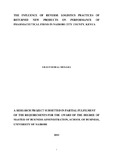| dc.description.abstract | This study was carried out to establish the influence of returned new products on performance
of pharmaceutical firms in Nairobi City County. The population of study consisted of the 23
pharmaceutical manufacturing firms as per the Export Processing Zones. The objectives of
study were to determine the extent to which pharmaceutical firms in Nairobi County have
adopted reverse logistics practices; to establish the influence of reverse logistics practices of
returned new products on performance of pharmaceutical firms in Nairobi County; and to
establish the challenges faced by the firms in implementing reverse logistics practices. The
research design was a descriptive cross-sectional research design. Data was collected using
semi-structured questionnaires administered through emails and drop and pick later method.
Eighteen questionnaires were returned, representing a 78.26% response rate. Mean scores,
standard deviations and percentages were the outputs of the first and third objectives.
Correlation analysis was used to determine if there was a relationship between the pertinent
variables. The relationship between reverse logistics of returned new products and
performance of the firms was then analyzed using multivariate regression analysis and the
findings presented in frequency tables. Relationship between reverse logistics and financial
performance had an R2 of 0.61 implying that 61% of the variation in the financial
performance was explained by reuse, recycle and landfill reverse logistics practices. The
relationship between reverse logistics and market performance had an R2 of 0.781 implying
that 78.1% of the variation in the market performance was explained by the reverse logistics
practices. It was therefore concluded that pharmaceutical firms in Nairobi have adopted
reverse logistics practices with reuse and landfill being predominant although they face
challenges that need to be addressed in order to further increase efficiency. To increase
financial performance, the firms should increase reuse and landfill reverse logistics with
minimal recycling, while increase in reuse reverse logistics would increase market
performance. The study recommends that firms should invest in appropriate technology for
reverse logistics and have detailed disposition strategies for their returned new products so as
to improve efficiency and productivity of the reverse logistics processes. | en_US |

